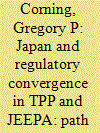| Srl | Item |
| 1 |
ID:
191669


|
|
|
|
|
| Summary/Abstract |
This paper compares Japan’s negotiations on regulatory convergence with the United States in the Trans-Pacific Partnership (TPP) and with the European Union (EU) in the Japan-EU Economic Partnership Agreement (JEEPA), focusing on the motor vehicle and medical device sectors. Despite the TPP being concluded first, JEEPA moved Japan closer to EU-defined or influenced standards in both sectors. This was primarily the result of path dependence created by existing interstate institutional arrangements in motor vehicles and by transnational cooperation in medical devices, rather than of the bilateral structure of the JEEPA talks producing more focused negotiating objectives and outcomes. The case studies suggest that PTAs can play a meaningful role in advancing regulatory convergence, but mostly as locking-in mechanisms for deals reached in other forums. Therefore, simultaneous PTA negotiations provide little impetus for regulatory triadic closure in the absence of a well-established path of regulatory cooperation.
|
|
|
|
|
|
|
|
|
|
|
|
|
|
|
|
| 2 |
ID:
162512


|
|
|
|
|
| Summary/Abstract |
After more than 4 years of negotiations, Japan and the EU have reached an agreement for bilateral free trade. The intended liberalization of trade in goods, agriculture, and services would create the world’s largest free trade area. Japan and Europe are sending a strong signal against protectionism and in favor of free trade and modernizing global trade rules. While free trade in the transatlantic and the transpacific context will remain an illusion for some time to come, the Japan-EU Economic Partnership Agreement (JEEPA) is a realistic option for trade partners at the western and eastern side of the Eurasian continent. The expected overall positive effects of JEEPA should not obscure the limitations and risks of the intended trade integration. There will be economic losers of the agreement both in Europe and in Japan. There is plenty of fuel for political and social conflict. And in light of the many informal barriers, market access to Japan will remain extremely difficult for European companies. Beyond trade policy, JEEPA has a political dimension, too. It shows the political will to counteract economic disintegration and the loss of political substance in the bilateral relationship. The aim is to intensify cooperation, which would benefit both sides economically and politically.
|
|
|
|
|
|
|
|
|
|
|
|
|
|
|
|